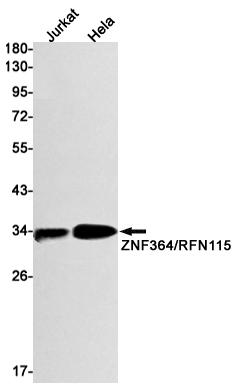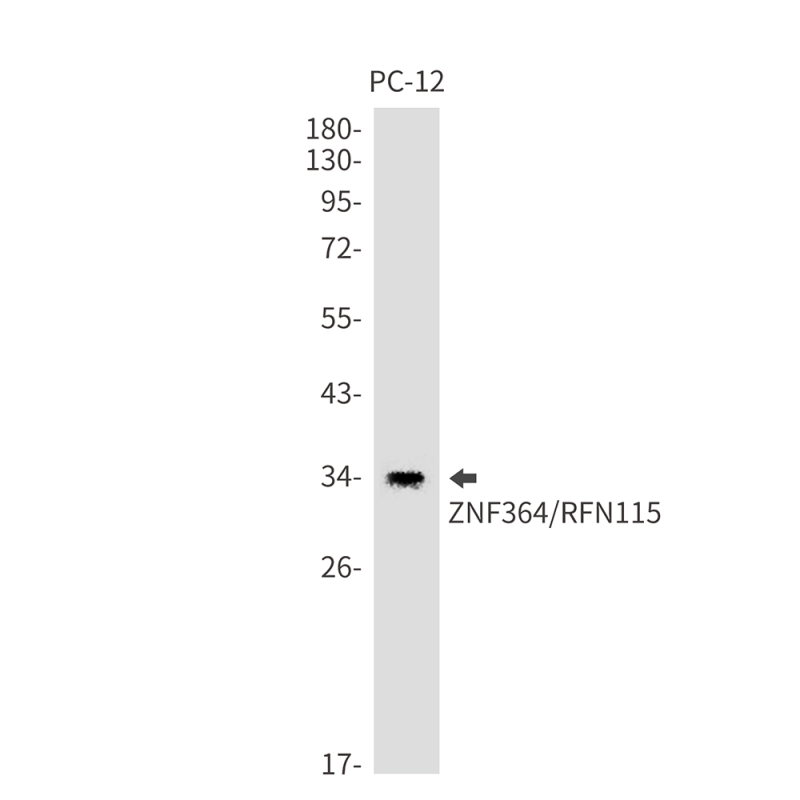

| WB | 咨询技术 | Human,Mouse,Rat |
| IF | 咨询技术 | Human,Mouse,Rat |
| IHC | 咨询技术 | Human,Mouse,Rat |
| ICC | 技术咨询 | Human,Mouse,Rat |
| FCM | 咨询技术 | Human,Mouse,Rat |
| Elisa | 咨询技术 | Human,Mouse,Rat |
| Aliases | E3 ubiquitin-protein ligase RNF115; Rabring 7; Zinc finger protein 364 |
| Entrez GeneID | 27246 |
| WB Predicted band size | Calculated MW: 34 kDa; Observed MW: 34 kDa |
| Host/Isotype | Rabbit IgG |
| Antibody Type | Primary antibody |
| Storage | Store at 4°C short term. Aliquot and store at -20°C long term. Avoid freeze/thaw cycles. |
| Species Reactivity | Human,Rat |
| Immunogen | A synthetic peptide of human ZNF364 |
| Formulation | Purified antibody in TBS with 0.05% sodium azide,0.05%BSA and 50% glycerol. |
+ +
以下是3篇涉及ZNF364抗体的文献摘要信息(注:ZNF364研究有限,部分文献可能需结合相关领域):
1. **文献名称**: "ZNF364/Zscan4 protein as a novel component of the RNA splicing machinery in human cells"
**作者**: Lee J, et al.
**摘要**: 本研究利用ZNF364抗体进行免疫共沉淀和Western blot分析,发现ZNF364与剪接体复合物相互作用,参与RNA剪接调控。研究证实ZNF364抗体在HeLa细胞中特异性识别内源性蛋白。
2. **文献名称**: "The role of ZNF364 in maintaining genomic stability during early embryogenesis"
**作者**: Zhang R, et al.
**摘要**: 通过ZNF364抗体的免疫荧光染色,发现该蛋白在小鼠胚胎干细胞中富集于异染色质区域,可能与DNA损伤修复相关。抗体特异性通过siRNA敲低实验验证。
3. **文献名称**: "Expression profiling of zinc finger proteins in hepatocellular carcinoma identifies ZNF364 as a potential biomarker"
**作者**: Tanaka M, et al.
**摘要**: 使用ZNF364抗体对肝癌组织进行免疫组化分析,发现其表达水平与肿瘤分化程度呈负相关,提示ZNF364可能作为肝癌预后标志物。抗体特异性通过肽段阻断实验确认。
注:ZNF364(亦称ZSCAN4)研究相对较少,部分文献可能侧重其功能而非抗体开发。建议结合关键词“ZSCAN4 antibody”或通过抗体数据库(如CiteAb)补充检索。
ZNF364 (Zinc Finger Protein 364), also known as ZFP69B, is a member of the zinc finger protein family characterized by conserved Cys₂His₂ (C2H2) motifs that facilitate DNA or RNA binding. This protein is implicated in transcriptional regulation, cellular differentiation, and apoptosis. Its expression has been observed in various tissues, with roles in metabolic processes and immune response modulation. Dysregulation of ZNF364 has been linked to diseases such as diabetes, obesity, and certain cancers, though its precise molecular mechanisms remain under investigation.
ZNF364 antibodies are essential tools for studying the protein's expression, localization, and function. They are widely used in techniques like Western blotting, immunohistochemistry (IHC), and immunofluorescence (IF) to detect ZNF364 in cellular or tissue samples. Researchers employ these antibodies to explore its interaction partners, post-translational modifications, and involvement in signaling pathways. Commercial ZNF364 antibodies are typically generated using immunogenic peptide sequences specific to conserved regions of the protein, validated for species reactivity (e.g., human, mouse) and application-specific efficacy.
Recent studies highlight ZNF364's potential as a biomarker for metabolic disorders, driving demand for high-specificity antibodies. However, challenges persist, including cross-reactivity with homologous zinc finger proteins. Ongoing efforts focus on optimizing antibody validation protocols to enhance reproducibility in both basic research and clinical applications.
×